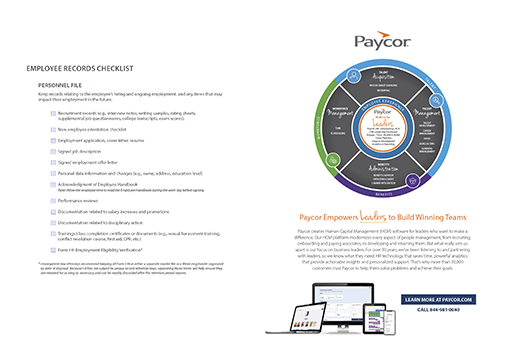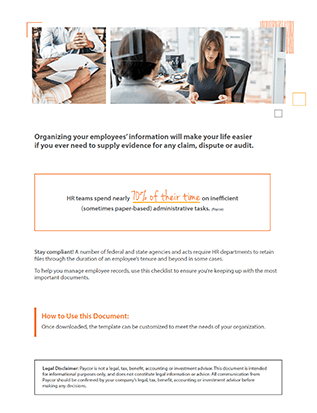Manage Employee Records with Confidence
Although those gray metal file cabinets aren’t as popular for office décor as they used to be, creating a system to maintain employee records is critical for your business. Organized documents are not just nice to have, they can also make it easier for you to evaluate claims and verify information, not to mention help you maintain compliance with federal and state employee recordkeeping requirements. It’s fair to say, when in doubt, don’t throw it out. However, there are rules to maintaining employee records. Some files should be compiled separately while others should be kept together. To help you manage employee records, we’ve created a checklist to help you ensure that you are keeping up with the most important documents.
Why is it important to maintain accurate employee records?
Maintaining accurate employee records is important for several reasons:
- Legal Compliance: Accurate employee records help you comply with various labor laws and regulations. These laws often require employers to maintain specific information about their employees, such as personal details, employment contracts, tax information, and work hours. Failing to keep accurate records can result in legal penalties and liabilities.
- Payroll and Benefits Administration: Accurate employee records are crucial for managing payroll and benefits effectively. They ensure that employees are paid accurately and on time, and that benefits such as health insurance, retirement plans, and leave entitlements are properly administered. Inaccurate records can lead to payroll errors, disputes, and dissatisfaction among employees.
- Performance Evaluation and Career Development: Employee records provide a historical record of an individual’s performance, achievements, and career progression within the organization. Accurate records enable managers to conduct fair and objective performance evaluations, identify training and development needs, and make informed decisions regarding promotions, transfers, or disciplinary actions.
- Succession Planning and Talent Management: Maintaining accurate employee records helps you plan for the future by identifying high-potential employees and creating succession plans. It enables management to assess the skills, qualifications, and experience of employees, and make informed decisions about talent management, workforce planning, and recruitment strategies.
- Compliance with Audits and Investigations: Having accurate employee records is essential during audits, investigations, or legal disputes. They provide evidence of employment history, training, certifications, and compliance with organizational policies. Inaccurate or incomplete records can hinder investigations and damage the your company’s reputation.
- Organizational Efficiency: Accurate employee records enable HR teams to access relevant information quickly, make informed decisions, and provide timely support to employees. This improves overall organizational efficiency and reduces administrative errors and delays.
What should be kept in employees’ files?
These days, electronic forms make it much easier to manage your employees’ records. Many employee files are maintained in an HCM platform and are readily accessible. Paycor HR, for instance, can use the information from a candidate’s application to create a new hire file, which eliminates duplicate work. This file includes:
- Job application and resume
- Job description
- Offer letter
- Personal data (address, emergency contact, etc.)
- Form I-9
What are employee recordkeeping requirements?
If you are manually keeping records and not yet using an HCM platform for employee records, there are at least three categories of information that your organization should retain through the duration of your employees’ career (and for several years afterward, depending on the document). This includes personnel files, medical/benefits files, and payroll files. There are also miscellaneous files that you should keep related to FMLA, EEO claims, COBRA and more.
- Personnel records include pre-employment items that can be carried over from the hiring process (above). These files can also include training checklists, employee handbook acknowledgment, performance reviews, documentation of disciplinary action, promotions, and certifications the employee earned.
- Medical and benefits files include doctors’ notes, worker’s compensation claims, injury reports, OSHA information, and beneficiary information.
- Payroll files include PTO usage documentation, work schedules, pay rate information, withholding documents, timecards, and overtime authorization.
Having the most up-to-date information about your employees will make your life easier if you ever need to supply employee documents for any claim, dispute, or audit.
Remember, when it comes to legal compliance for employee recordkeeping, be sure to mind the rules of your state in addition to federal laws. There are specific requirements for retaining paperwork for up to three years post-termination and storing some files separately to comply with privacy laws such as HIPAA.
How long should a company keep employees’ records?
Some record retention policies vary by state, but federal agencies are clear on what should be kept where and for how long. For example:
- The Age Discrimination in Employment Act (ADA) requires that employers must keep all payroll records for three years.
- Equal Employment Opportunity Commission (EEOC) regulations require that employers keep all personnel or employment records for one year.
- The Fair Labor Standards Act (FLSA) states that employers must keep payroll records for at least three years and employers must keep all records (including wage rates, job evaluations, seniority and merit systems, and collective bargaining agreements) that explain the basis for paying different wages to employees of opposite sexes in the same establishment.
- Employment law attorneys recommend keeping Form I-9 in a separate file to monitor expiration dates as they are subject to specific record retention laws.
- Due to privacy laws and the Americans with Disabilities Act (ADA), employee medical records must be kept separate from basic personnel files.
What are the legal implications of improper employee record-keeping?
Improper employee record-keeping can have several legal implications for organizations. Some of the key legal consequences include:
- Audits and Investigations: Inaccurate or incomplete employee records can raise suspicions during audits or investigations by regulatory bodies, such as labor departments or tax authorities. Non-compliance with record-keeping requirements can trigger further scrutiny, fines, penalties, or legal actions.
- Non-compliance with Labor Laws: Many labor laws and regulations require employers to maintain accurate and up-to-date employee records. Failure to comply with these requirements can result in legal penalties, fines, and sanctions.
- Wage and Hour Disputes: Inaccurate or incomplete employee records can lead to disputes related to hours worked, overtime, and other compensation issues.
- Discrimination and Harassment Claims: Employee records play a crucial role in defending against discrimination and harassment claims. If an employer fails to maintain accurate records related to complaints, investigations, or disciplinary actions, it can weaken their defense in legal proceedings.
- Privacy and Data Protection Breaches: Improper handling of employee records can lead to privacy breaches and violations of data protection laws. If sensitive employee information is accessed, disclosed, or used inappropriately, it can result in legal claims, regulatory investigations, and reputational damage.
Who is responsible for managing employee records?
Employee record retention is a core function of HR. Documents should be kept in a secure facility, document management system (DMS), or in cloud storage with restricted access to respect employee data privacy. Many employers now use electronic recordkeeping to save space, eliminate unnecessary environmental waste, and to save time when searching for a specific document.
How can digital document management systems improve record-keeping efficiency?
Digital document management systems can significantly improve record-keeping efficiency in several ways:
- Easy Access and Retrieval: Digital systems allow for quick and easy access to employee records from anywhere, at any time. Instead of searching through physical files or multiple spreadsheets, HR professionals can simply search for specific information or use filters to find the required records. This saves time and effort, enabling faster decision-making and response to employee inquiries.
- Centralized Storage: Digital document management systems provide a centralized repository for all employee records. This eliminates the need for physical storage space and reduces the risk of misplacing or losing important documents. It also helps ensure that all records are stored in a consistent and organized manner, making it easier to locate and manage information for everyone.
- Enhanced Security: Digital systems offer improved security measures to protect sensitive employee information. Access controls, encryption, and user permissions can be implemented to ensure that only authorized personnel can view or modify records. This reduces the risk of unauthorized access, data breaches, or loss of confidential information.
- Version Control and Audit Trails: Digital document management systems often include version control features, allowing HR professionals to track changes made to records over time. This ensures that a complete history of modifications is maintained, providing transparency and accountability. Additionally, audit trails can be generated to track who accessed or modified records, further enhancing data integrity and compliance.
- Automation and Workflow Integration: Automate various record-keeping processes, such as data entry, document creation, and notifications, reducing manual effort and minimizing the chances of errors or omissions. Integration with other HR systems, such as payroll or performance management software, enables seamless data transfer and updates, ensuring consistency across different processes.
- Scalability and Disaster Recovery: Digital systems can easily accommodate growing volumes of employee records without the need for physical expansion. They also offer backup and disaster recovery capabilities, ensuring that records are protected in case of system failures, natural disasters, or other unforeseen events.
How Paycor Helps
HR software affects every aspect of your business. If those solutions aren’t modern and adaptable, or get in your way more than they help, your whole business feels the impact. HR teams spend nearly 70% of their time on inefficient (sometimes paper-based) administrative tasks. To get out of the weeds, you need to stop spending your time on transactional human resource functions that should be automated.
Paycor’s online HR software helps you get work done by automating common workflows from onboarding to offboarding, removing the need for rekeying data with our unified database and enabling you to go paperless with our document and form solutions. Access, edit, and update all employee information in one place, including timecards, pay rates, contact information, and more.











